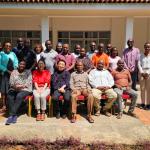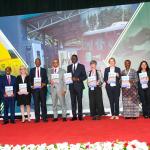Materials Testing & Research Division
The Division of Materials, Testing and Research has a role to play in ensuring a well rehabilitated and expanded infrastructure in the country. The Division is mainly charged with the responsibility of testing and researching on materials used in the road construction and building industry to ensure quality.
The State Department of Roads continues to invest significantly to address quality and secure construction of infrastructure and road safety in an economical approach.
In order to attain this, the Division closely monitors road projects in the country so as to ensure compliance to set standards and specifications. Research on alternative pavement construction materials is also carried out to promote reduction of the cost of road construction. This will go a long way in the achievement of Vision 2030 objectives.
MTRD has a role to play in ensuring well rehabilitated and expanded infrastructure through testing of materials, design of new roads and bridges, rehabilitation and construction of roads and evaluation and monitoring of roads and other structures.
With implementation of vision 2030 goals, the building sector has grown tremendously and MTRD has a role of ensuring that construction materials used in the building sector are tested for compliance.
Vision 2030 also recognizes the role played by Research and Development (R&D) in accelerating economic development in newly industrializing countries. The Division has role in Research in new and cost-effective construction materials.
The Division is located and has central laboratories in Nairobi Industrial Area and sixteen (16) regional laboratories located in Mombasa, Garissa, Embu, Machakos, Nyeri, Nakuru, Eldoret, Kisumu, Kisii, Kakamega and Bungoma, Kerugoya, Muranga, Narok, Mwatate and Meru regions.
The Mandate of Materials Testing and Research Division
The Division’s mandate is testing and research on roads and building construction materials, road pavement design and construction specifications, construction quality control and assurance, and post construction evaluation of roads and other infrastructure.
The mandate of the Division is delivered through the following core functions:
- Provision of laboratory and testing facilities for:
- Geological and geotechnical investigations;
- Geospatial surveys;
- Hydrological surveys and hydraulic studies;
- Traffic surveys and studies;
- Prospecting, examination and testing of construction materials;
- Construction quality control; and
- Post construction monitoring and evaluation of roads, bridges, buildings and other connected civil works including Non-Destructive Testing;
- Testing, calibration, and verification of precision instruments, gauges, scientific apparatus, and other laboratory and field measurement equipment to ensure compliance with the provisions of both the Standards Act and the Weights and Measures Act;
- Certifying Civil Engineering Laboratory Technicians;
- Vetting of pavement designs for road upgrading, reconstruction, rehabilitation and strengthening works by roads authorities;
- Construction quality control oversight on public roads including post construction evaluation of completed works;
- Monitoring functional and structural performance of road pavements including axle load and pavement condition surveys on all public roads to facilitate preparation of public investment and annual works programmes by other road agencies;
- Maintenance of pavement construction and maintenance data base for public roads;
- Research on road development, maintenance, and operations including research on new construction materials, construction methods and road safety studies;
- Undertake collaborative research activities in liaison with other local and international Organizations;
- Disseminate Research undertakings and findings;
- Development and review of materials testing standards, road design manuals and standard specifications for construction and maintenance of roads in conjunction with other roads authorities and stakeholders;
- Provide materials testing and consultancy services at nominal charges to other government Divisions, Roads Authorities and the public; and
- Advise the government on road construction, maintenance and operation standards, on physical, chemical and engineering characteristics of materials and on materials usage.

Functions
a) Providing testing services for building and construction materials
b) Conducting geotechnical investigations to establish adequate foundations for buildings & bridges
c) Non-Destructive tests on the buildings
d) Contributing in building of resilient infrastructure through pavement designs and quality control oversight in construction of roads countrywide.
e) Review of standards and design manuals
f) Research on new building and road construction methods and materials
g) Through training and certification of technologists and technician, availability technical workforce is increased
Strategic Objectives Materials Testing and Research Division
a) To ensure prolonged road pavement life
b) To ensure compliance with Structural integrity of buildings and bridges
c) To enforce value for money in construction of roads and bridges
d) To identify areas of research and innovations methods
e) To establish a resource centre for technical knowledge.
f) To provide consultancy services to the building and construction industry
g) To expand and upgrade material testing facilities
h) To expand and upgrade ICT systems
i) To attain and retain optimum HR levels
j) To transform the Division into SAGA
k) To establish Materials Testing and Research Fund
l) To establish resource mobilization mechanisms
Achievements
a) Improved Revenue collection – realized KShs 41 million against the targeted KShs 40 million despite the slowdown in economic activities
b) Renovations at headquarters in Nairobi - plumbing system has been upgraded from that done earlier during construction, improved work environment including landscaping, improvement of drainage system from roof to the open and man holes.
c) Creation of a central sample collections point, manned by staff from various training background to better manage the clients and improve the integrity of operations
d) Improvement of ICT system. Installed:
i. Client - Server System – a comprehensive technology network system including network cabling, components and devices, providing a single unified IP telephony infrastructure integrating multiple methods of communication to connect, collaborate and exchange information such as video calling and conferencing, mobile communication and even desktop sharing providing improved efficiencies, and next generation firewall solution improvement to Tier 1 data Centre and category 6A cabling.
ii. Library Information Management System (LIMS) – improvement from disaggregated systems to integrated and improved manual library and e-library. The library is an institutional repository helping preservation of information and learning for use by staff, academia and other stakeholders supporting internal and external e-learning.
iii. Laboratory Management System (LMS) – improvement from manual to automated testing system from enquiry, sample registration to issuance of reports and feedback, developing and implementing an engineering-based software solution ensuring integrity of the test results, data, reports, analytics and process with historical data management
iv. Pavement Management & Material Systems (PMS) – to have a server-based data storage and automatic analysis as per select processes, enhance capacity of users, technical administrators and managers, to establish systems that facilitate fast and efficient access to accurate testing, improve service delivery through efficient business processes that are technologically enabled using a developed Pavement Management System.
e) Improved Human resources capacity through on the job training through rotational laboratory deployment and training workshops on improvement of quality control measures during material testing and construction.
f) Improved equipment capacity through procurement of modern laboratory and field data collection equipment.
g) Transformation to SAGA – the affected staff have been sensitized, the Joint Technical Committee (JTC) has done and presented the Draft Roads Bill 2023 and Draft final Reports to the Principal Secretary
For more information visit our MTRD Official Website






